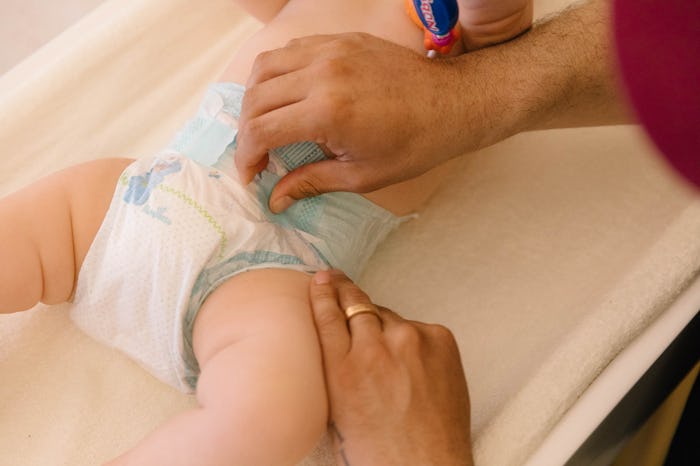Life
Um, Here's What *Really* Happens If You Don't Wash Your Hands After A Diaper Change
Everyone knows that dealing with infants can be hectic, especially when you’re trying to change their diaper and clothes all while keeping them from rolling off the changing table while they’re screaming in your ear. Once you’re finally done, you put them back into their crib or bouncer, and you become distracted by something else and forget to wash your hands. But what happens when you don’t wash your hands after changing a diaper? Are you and your entire family, including your baby, going to get really sick? Is hand sanitizer sufficient between you finishing up the diaper change and then touching your baby to put them down?
Warning, this may be disconcerting and gross for some folks — especially germaphobes — but at any given time, there are many types of bacteria, parasites, and fungi that live on your hands. However, some organisms serve protective functions, such as competing against harmful organisms and competing for nutrients, according to Dr. Ketan Shah, a gastroenterologist at MemorialCare Saddleback Medical Center in Laguna Hills, California. These organisms are called “resident flora,” Shah says. “Transient flora are acquired from contaminated surfaces or people, are more amenable to removal by hand hygiene, and can be associated with infections. These include staph aureus, E. coli and other gram-negative bacilli, viruses, and yeast. Millions of bacteria normally live on our hands, and the number of bacteria doubles after using the restroom,” Shah explains. And this includes if you don’t wash your hands after changing a dirty diaper.
How easily does that bad bacteria spread to other things in your home, including your own baby? “Bacteria and viruses from our hands can easily spread to environmental surfaces in our home and stay present for hours in some cases, and lead to potentially serious infections in others,” according to Dr. Anjali Vora, an infectious disease physician and the medical director of infection control at Orange Coast Medical Center in Fountain Valley, California.
Shah says, “80 percent of transmissible infections are spread by touch, including touching others, but even touching one's own mouth, eyes, and nose. Most bacteria, viruses, and parasites are spread by the ‘fecal-oral’ route, which means organisms on hands, contaminated after using the restroom, end up in the mouth of another person. While this seems unlikely, it only takes a single touch to contaminate a surface, then another touch to pick up the organisms. This especially affects babies and young children, since they are constantly putting their hands and objects into their mouths.”
And if you do somehow ingest this bacteria, what happens to your body? “Germs that can be transmitted by contaminated hands can be swallowed or inhaled, such as salmonella, E. coli, norovirus, adenovirus, and influenza, [and] these germs can cause gastrointestinal illnesses such as gastroenteritis (vomiting, diarrhea) and C. difficile colitis or respiratory illnesses such as the common cold, flu, and strep throat. Other illnesses transmitted by contaminated hands include hand-foot-mouth disease and eye infections. All of these infections can be prevented by hand hygiene,” Shah says.
So as far as good hand hygiene goes, is it enough to just use hand sanitizer? It seems impossible to wash your hands immediately and before touching your baby after changing them. Vora says, “An alcohol-based hand sanitizer with at least 60 percent alcohol content can be used in place of washing your hands. Washing with an antimicrobial soap and water may be preferred, as it also ensures removal of soil and fecal material from hands. However, if your hands are not visibly soiled and were not in direct contact with urine of fecal material, an alcohol-based hand sanitizer could be used in place of soap and water, as this may be more convenient." Especially since you can keep a bottle close to your diapering station.
Then, it might be a good idea to still wash your hands anyway after securing your baby. Vora says you should wash your hands for a minimum of 20 seconds, whether using an antimicrobial soap or when you rub hand sanitizer on them. Shah adds, “On one hand, studies have shown that alcohol-based sanitizers may be more effective at clearing pathogens, but on the other hand, certain pathogens are not effectively killed by alcohol-based sanitizers, such as norovirus, C. difficile, and cryptosporidium. According to the CDC, washing hands with soap and water is the best way to reduce the number of microbes in most situations. If soap and water are not available, then the next best intervention is using an alcohol-based sanitizer with an alcohol concentration between 60 and 95 percent. Hand sanitizers also don't work as well when our hands are heavily soiled or greasy.”
Clearly, washing your hands after you change your baby’s diaper is super important, but until your baby is secure, be sure to use some heavy-duty hand sanitizer before picking up your baby, and then wash your hands for at least 20 seconds in hot water with antibacterial soap. If you don’t, you’re putting yourself and your entire family at risk for getting some pretty nasty bacteria in their bodies. And nobody has time for that.
Check out Romper's new video series, Romper's Doula Diaries:
Watch full episodes of Romper's Doula Diaries on Facebook Watch.
